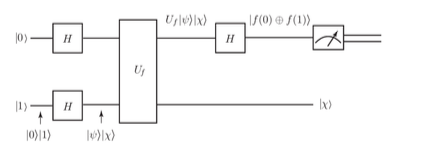6.4.5.Deutsch Algorithm’s Quantum Circuit
The main components of this algorithm’s circuit are:
- Hadamard Gates: Used in the first and last steps to create superposition and interference.
- Function Operator ( Uf): Integrates the effect of the function into the quantum state.
- Measurement: The first qubit is measured to obtain the result.
The circuit operates as follows:
- Hadamard gates are applied to the initial state |0> |1>
- The ( Uf ) operator encodes f(0) and f(1) into the quantum state.
- The final Hadamard gate is applied, followed by a measurement.

The quantum advantage in this algorithm is based on quantum mechanical principles such as superposition (being in multiple states simultaneously) and interference (states canceling or reinforcing each other):
- Superposition: The Hadamard gate processes |0> |1> simultaneously.
- Interference: The effect of ( Uf ) determines the measurement results based on whether the function is constant or balanced.
The Deutsch algorithm demonstrates that quantum computing can provide a fundamental speedup compared to classical computational methods. For more complex problems, the advantages of quantum algorithms become even more pronounced.